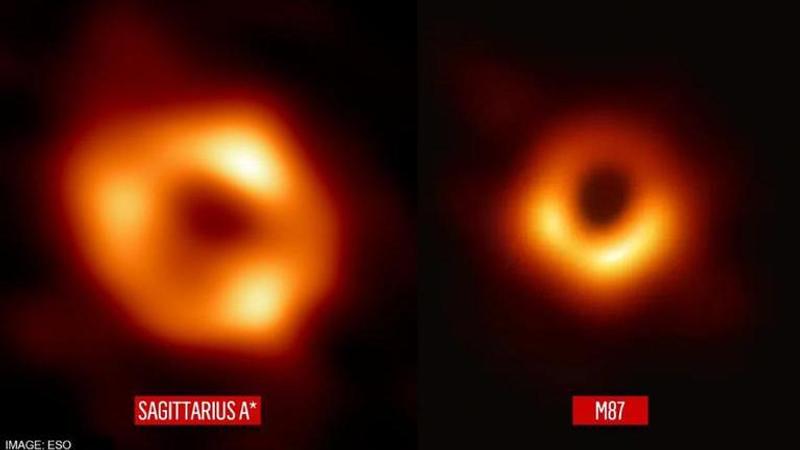Published 20:16 IST, May 15th 2022
Milky Way's vs Messier 87's supermassive black hole; read to know how they compare?
The Milky Way's supermassive black hole was recently unveiled by the Event Horizon Telescope. Here's how different it is from Messier 87's.

The Event Horizon Telescope (EHT) recently made a ground-breaking revelation by releasing the first-ever image of the supermassive black hole at the heart of the milky way galaxy. This black hole named Sagittarius A* or Sgr A* is lurking about 27,000 light-years away from Earth and proves Albert Einstein's Theory of General Relativity which predicted the existence of these objects. Notably, this is the second time astronomers have directly photographed a supermassive black hole, as the first belonged to Messier 87 (M87) galaxy. Let us take a look at how different these two behemoths are from each other.
(Image: ESO)
But before we begin, it is important to understand what the photo above depicts. Black holes as we know them, have an intensely strong gravitation pull that warps spacetime and does not allow light to escape. However, due to this strong gravitational pull, the black holes gather all the materials onto them and convert them into light. In the image above, what you see is a glowing ring-like structure, produced by the materials gathered by the black hole, surrounding a dark central region called the shadow, which actually is the black hole.
Messier 87's supermassive black hole
This giant black hole was the first of its kind to be directly photographed in 2019. The first major aspect where the M87 black hole differs from the Sgr A* is the sheer size and of course, the location. Residing in the Messier 87 galaxy, the supermassive black hole is 55 million light-years from Earth and has a mass 6.5 billion times that of the Sun. In the press conference where collaborators of the EHT released the image, the astronomers revealed that if the Sgr A* is the size of a donut, the M87 would be bigger than a soccer stadium.
(Image: ESO)
Milky Way's supermassive black hole
This newly photographed supermassive black hole resides 27,000 light-years away and weighs significantly less than M87, approximately four million times more massive than our Sun. It is worth noting, however, that since both the objects have enormous gravitational strength, both black holes have a glowing ring around them. The ESO released several pictures comparing the two objects embedded at the galactic center. The image above shows the M87 black hole staggeringly outsizing the Sgr A* despite being over 61 lakh light-years away.
In another image, the astronomers compared the size of the black holes using Mercury's orbit along with that of the pluto and the sun's diameter. Despite all these differences, one thing that's common between these behemoths is that both were observed using the Event Horizon Telescope (EHT), which is a collaboration of eight observatories that join forces to form an Earth-sized telescope.
Updated 20:16 IST, May 15th 2022






